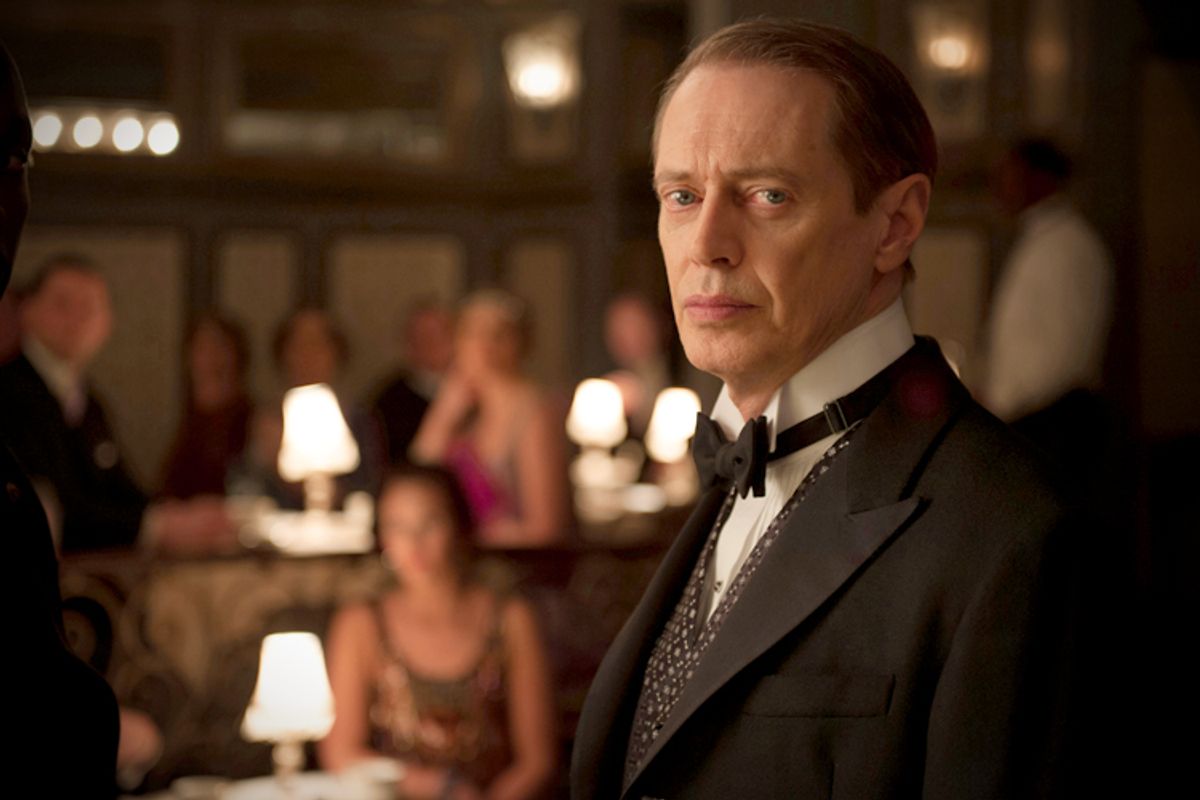"Boardwalk Empire" had me at Prohibition — that glorious midnight of 1920 that kicked the series off in 2010. Since then, like the black hand of its nefarious protagonists, it has meandered straight down the chute into the depths of a long night that doesn’t seem to even hope for dawn.
The first few seasons were breathtaking in story line, costume and set, and completely, inaccurately, violent. Alcohol prohibition was never the bloody mess Boardwalk Empire pretends it was, but blood sells and the artistic finesse with which it is produced lends itself a forgivable pass.
But last season saw heroin, and this season, cocaine, mixed into the "Boardwalk Empire" cocktail recipe, and it is not mixing well.
We see Valentin Narcisse, the show’s new, Trinidadian-born, back-to-Africa bad man, selling heroin. Gillian has become a hopeless junkie and Al Capone is no longer just a lunatic, he’s a coked-up lunatic. Al Rothstein, Meyer Lansky and Charlie Luciano are all making their share on the heroin trade too, and the viewers are left thinking: so that’s the origin of the black market.
The truth is Al Capone was not a crazed, homicidal cokehead in 1924. (Boardwalk Empire has him looking less like a competent black market businessman and more like a poster child of anti-cocaine propaganda of the time.) And while Rothstein might’ve been in the heroin trade, alcohol, gambling and prostitution were the holy trinity of black market business ventures, and Italians often viewed heroin as an unnecessary venture — both financially, and for the health of their communities. Heroin wasn’t outlawed in the U.S. until 1924, and we don’t see heroin become an overarching mafia commodity and popular counterculture drug for another 20 years (though certainly over those years it percolated, and took the place of booze after alcohol prohibition ended in 1933).
Painting the Marcus Garvey group, Universal Negro Improvement Association and African Communities League, as selling heroin in the early 1920s is a misappropriation of history. HBO itself is on record saying Narcisse is modeled on a man in Harlem — not a heroin kingpin, but a numbers runner.
You see, in 1924, contrary to the show’s vivid mythology, heroin wasn't yet popular in African American communities or among entertainers. It would become a major part of the Harlem jazz scene, for instance, in the '30s.
Really, the big drug was marijuana.
In the mid-1920s, marijuana wasn’t yet illegal on a national level. It was considered harmless recreation by most Americans, though some believed, spurred on by propaganda, that it was the devil’s weed, used mainly by Mexican immigrants in the seduction of good Christian white women. Throughout the '20s and '30s, more and more music was written heralding the plant, including Cab Calloway’s still-famous “Reefer Man” (1932).
But "Boardwalk Empire" doesn’t even nod in the direction of marijuana’s contribution to the music, language or entertainment it depicts, instead turning to hard drugs to give a quick illicit drug fix to the attentive viewer.
Incredibly, none of the showpeople or African American characters on "Boardwalk Empire" seem to know cannabis exists. In fact, given marijuana’s prominence in the 1920s, its absence might itself be considered a crime — how dare "Boardwalk Empire" rob us of this true detail that inspired dozens of jazz songs at the time and are still enjoyed, performed and appreciated today, including “Golden Leaf Strut” (Original New Orleans Rhythm Kings), “Willie the Weeper” (Frankie Half Pint Jaxon), “Muggles” (Louis Armstrong) and “Jive Man Blues” (Frankie Jaxon and Tommy Dorsey).
The 1920s are filled with a subversive history that could be more deeply explored: Marcus Garvey’s crew might not have been selling heroin, but they were certainly on their own quests, both financial and social, that would eventually land Garvey in prison and then get him deported — an interesting plot that is only lightly alluded to and trumped by Narcisse’s heroin dealing.
Add in the women’s movement to end prohibition, or dive into any number of Rothstein’s ventures — even his heroin trade (but don’t pretend it was coming from Garvey’s crew).
And — where is the pot dealer? Isn’t he worth as much screen time as Al Capone’s coked-up homicidal caricature?
Of course, it is not "Boardwalk Empire’s" job to adhere to historical accuracy. "Never let the truth get in the way of a good story," as Nucky says, quoting Mark Twain.
But the overindulgence in hard drugs and nonexistence of marijuana is distracting and disappointing to any history buff who refuses to suspend disbelief in order to drink what’s presented as the real McCoy.
The rest of America is being slipped a weekly mickey — and drinking it up.



Shares